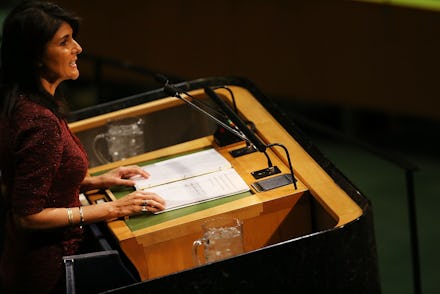UN condemns US decision to recognize Jerusalem as Israel’s capital, defying Trump and Haley

The United Nations during an emergency session Thursday condemned the White House’s decision earlier this month to officially recognize Jerusalem as the capital of Israel — despite threats of funding cuts by President Donald Trump and his U.N. ambassador, Nikki Haley.
In a 128-to-9 vote, with 35 abstentions, the U.N. passed a nonbinding resolution calling on the United States to reverse its controversial move on Jerusalem — defying the president’s threats to slash aid to countries who vote against the U.S. and Haley’s suggestion that the U.S. may pull its funding from the U.N. over the measure.
“Any decisions and actions which purport to have altered the character, status or demographic composition of the Holy City of Jerusalem have no legal effect, are null and void and must be rescinded in compliance with relevant resolutions of the Security Council,” according to the resolution adopted by the U.N. General Assembly Thursday.
The U.S. and Israel were among the nine countries to vote against the measure.
Canada, Australia and Mexico were among the 35 member nations to abstain from the vote.
The vote came a day after Trump said the U.S. would be “watching those votes” — and following a speech Thursday in which Haley implied the U.S. would not only cut aid to countries that voted in favor of the resolution, but that it could pull its funding from the U.N. as a whole.
“Let them vote against us,” Trump said Wednesday. “We’ll save a lot. We don’t care.”
Haley doubled down on the president’s comments in statements on Twitter and in a scolding speech before the U.N. General Assembly ahead of the vote Thursday.
“America will put our embassy in Jerusalem. No vote in the United Nations will make any difference on that,” Haley said. “But this vote will make a difference in how Americans look at the U.N., and on how we look at countries who disrespect us in the U.N.”
“We have an obligation to demand more for our investment,” she said. “And if our investment fails, we have an obligation to spend our resources in more productive ways.”
128 nations defy Trump threats over UN resolution
But those threats weren’t enough to deter an overwhelming majority of U.N. members from voting for the measure.
Iraq, Afghanistan, Egypt and Jordan — which are among the countries that receive the most aid from the U.S. — each voted in favor of the resolution.
Pakistan, which also receives significant aid from the U.S., co-sponsored the measure.
Turkish Foreign Minister Mevlut Cavusoglu, who voted in favor of the resolution, slammed the U.S. for “bullying” other nations ahead of the decision on the measure.
The White House declined to comment on any potential cuts to aid or U.N. funding in the wake of the vote, referring Mic’s questions to the Office of Management and Budget, which did not immediately respond to Mic’s request for comment.
But Dan Arbell, the former deputy chief of mission at the Israeli embassy in Washington, told Mic in a phone interview before the vote that such threats would be tough for the president to follow through on in any meaningful way.
“It will be very difficult to carry this out,” said Arbell, now a nonresident senior fellow at the Brookings Institution’s Center for Middle East Policy. “It’s not impossible, but if he does, I think it will be more symbolic than anything else.”
As Arbell noted, the president would need the backing of Congress to take drastic action on foreign aid — and taking such a measure could impact America’s relationship with important strategic partners in the region.
“I’m not ruling out that he will take some stand or at least go through the motions and try to demonstrate that he’s not just all talk,” Arbell said. “But it’s hard to see how many members of Congress would be supporting such a move.”
Trump on Dec. 6 announced that he was planning to move the U.S. embassy in Israel from Tel Aviv to Jerusalem, casting a cloud of uncertainty over the future of peace negotiations between Israel and Palestine.
“Today we finally acknowledge the obvious, that Jerusalem is Israel’s capital,” Trump said.
The announcement was met with protests around the world and warnings from international leaders.
The U.S. vetoed a similar resolution condemning the move at the U.N. Security Council earlier this week.
Haley said ahead of the vote Thursday that the outcome would not change U.S. policy in Israel and that Washington would “remember” the vote in its future dealings with the U.N. and the countries that voted for the resolution.
“When we make generous contributions to the United Nations, we also have a legitimate expectation that our goodwill is recognized and respected,” Haley said. “When a nation is singled out for attack in this organization, that nation is disrespected. What’s more, that nation is expected to pay for the privilege of being disrespected. In the case of the U.S., we are expected to pay more than anyone else for the dubious privilege.”
Correction: Dec. 21, 2017